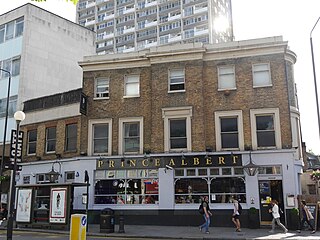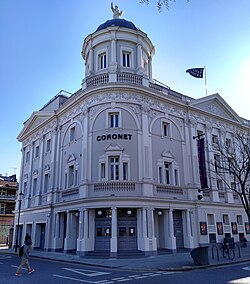
The Dominion Theatre is a West End theatre and former cinema on Tottenham Court Road, close to St Giles Circus and Centre Point, in the London Borough of Camden. Planned as primarily a musical theatre, it opened in 1929, but the following year became a cinema—it hosted the London premiere of Charlie Chaplin's City Lights with Chaplin in attendance—and in 1933 after liquidation of the controlling company was sold to Gaumont cinema chain, which later became part of the Rank Organisation. It was a major premiere cinema until the 1970s, when it began to host live concerts.

The Gaumont Film Company, often shortened to Gaumont, is a French film studio headquartered in Neuilly-sur-Seine, France. Founded by the engineer-turned-inventor Léon Gaumont (1864–1946) in 1895, it is the oldest extant film company in the world, established before other studios such as Pathé, Titanus (1904), Nordisk Film (1906), Universal, Paramount, and Nikkatsu.

The Odeon Luxe Leicester Square is a prominent cinema building in the West End of London. Built in the Art Deco style and completed in 1937, the building has been continually altered in response to developments in cinema technology, and was the first Dolby Cinema in the United Kingdom.

The Odeon Luxe West End is a two-screen cinema on the south side of Leicester Square, London. It has historically been used for smaller film premieres and hosting the annual BFI London Film Festival. The site is on an adjacent side of the square to the much larger flagship Odeon Luxe Leicester Square.
Odeon Cinemas Limited, trading as Odeon, is a cinema brand name operating in the United Kingdom, Ireland and Norway, which along with UCI Cinemas and Nordic Cinema Group is part of the Odeon Cinemas Group subsidiary of AMC Theatres. It uses the famous name of the Odeon cinema circuit first introduced in Great Britain in 1930. As of 2016, Odeon is the largest cinema chain in the United Kingdom by market share.

Betrayal is a play written by Harold Pinter in 1978. Critically regarded as one of the English playwright's major dramatic works, it features his characteristically economical dialogue, characters' hidden emotions and veiled motivations, and their self-absorbed competitive one-upmanship, face-saving, dishonesty, and (self-)deceptions.
Katy Jane Carmichael is an English actress, director and producer. She is most known for her roles Twist Morgan in the Channel 4 sitcom Spaced, Lucy Barlow in the ITV soap Coronation Street, and Melissa Ryan in Waterloo Road. As a director-producer, her work includes the award-winning Mayday Mayday.

Mayflower Theatre is a Grade II listed theatre in the city centre of Southampton, England, with a capacity of 2,300. It features West End theatre shows when they tour the United Kingdom. In addition to this, one-off comedy shows and music events often take place at the theatre too.
The Ambassador Theatre Group (ATG), now rebranded to ATG Entertainment is a major international live entertainment organisation headquartered in the United Kingdom, with offices in Woking, London, New York, Sydney, Mannheim and Cologne. ATG's key operations comprise three inter-related activities: venue ownership and management, ticketing and marketing operations, and show productions.

The New Gallery is a Crown Estate-owned Grade II Listed building at 121 Regent Street, London, which originally was an art gallery from 1888 to 1910, The New Gallery Restaurant from 1910 to 1913, The New Gallery Cinema from 1913 to 1953, and a Seventh-day Adventist Church from 1953 to 1992. After having been empty for more than ten years, the building was a Habitat furniture store from 2006 to 2011, and since September 2012 it is a flagship store for Burberry.
The Odeon Haymarket was a cinema on Haymarket, London. Three cinemas occupied the site between 1925 and 1996, predecessors being Capitol Cinema (1925–1936) and Gaumont Haymarket (1937–1959). It became the Odeon Haymarket in 1962, before closing in 1996.

The Marina is a theatre and cinema in Lowestoft, Suffolk, originally opened in the Victorian era. The venue has an auditorium seating 800. It plays host to major West End productions, top comedy, orchestral concerts, touring drama and musical productions, opera, ballet, music, dance and celebrity concerts as well as operating a successful cinema operation - boasting the largest screen and cinema auditoria in the town. The Marina annually hosts the largest professional pantomime on the East Anglian Coast.

National Theatre Live is an initiative operated by the Royal National Theatre in London. It broadcasts live, by satellite, performances of their productions to cinemas and arts centres around the world.

In 1898 William Morton's Theatre Royal showed a 'Veriscope' film, probably the first time any film was shown in a Hull theatre. The Prince's Hall was the first purpose-built cinema in Kingston upon Hull, and was opened in George Street by Morton in 1910. As Hull embraced the new age of public entertainment, attendances at traditional theatre declined. Luxurious cinemas, taking their inspiration from theatres and music halls, were built to accommodate audiences in almost every neighbourhood in the city. By 1914, there were 29 cinemas, theatres and halls showing films in the city. The London and Provincial Cinema Company owned the Hippodrome; the National Electric Picture Theatres owned the Theatre de Luxe, but Morton's was the largest and most influential cinema chain in Hull.

John Stanley Coombe Beard FRIBA, known professionally as J. Stanley Beard, was an English architect known for designing many cinemas in and around London.
Lucy Bailey is a British theatre director, known for productions such as Baby Doll at Britain's National Theatre and a notorious Titus Andronicus, described by a critic as "all eye-catchingly visceral but there’s little depth". Bailey founded the Gogmagogs theatre-music group (1995–2006) and was Artistic Director and joint founder of the Print Room theatre in West London (2010-2012). She has worked extensively with Bunny Christie and other leading stage designers, including her husband William Dudley.

The Gate Theatre is a theatre in London, Camden. In July 2022, it announced a new residence at 26 Crowndale, Camden, London, NW1 TT, following an extensive search for a more accessible home. The new premises offers a wheelchair accessible and step-free performance space with 120 seats, as well as an in-house bar and foyer space. It was originally established above the Prince Albert pub in Notting Hill in 1979. With 75 seats, it was known as the smallest “off-West End” theatre in the city.
Bradford Odeon is the name applied to two different cinemas in central Bradford, West Yorkshire, England. One, in Godwin Street, was built in 1930 and survives; the other, in Manchester Road, was built in 1938 and demolished in 1969.

The Tivoli Theatre of Varieties was a popular English theatre based in the Strand, West London. It was designed by Charles Phipps and was built during 1889–90 at a cost of £300,000. It was constructed on the former site of the Tivoli Beer Garden and Restaurant. In the consortium that financed the project was the actor Edward O'Connor Terry. The hall opened on 24 May 1890 and was located opposite the Adelphi Theatre.

The former Granada Cinema, also known as the Ebenezer Building or Cathedral of Christ Faith Tabernacle, in Woolwich, South East London, was built as a large and luxurious cinema in the 1930s. It had a seating capacity of nearly 2500 and is now being used as a church hall. The building with its extravagantly decorated interior is a Grade II* listed building.
















